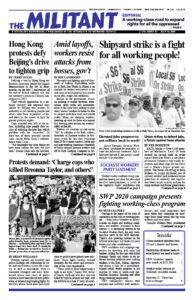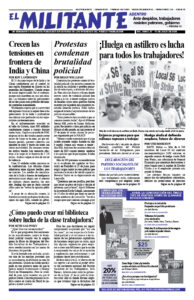July 24, 1995
DECATUR, Illinois — Members of the United Auto Workers on strike against Caterpillar took advantage of the one-year anniversary of their walkout to show their determination to continue the fight. Several days of expanded picket-line activity were followed by a march and rally of 3,000-4,000 in this city June 25.
UAW member Gary Garner was happy to see fellow strikers and other unionists turn out for the march. “Money is not the important thing. It’s treating people like people,” he said.
Garner responded to recent speculation that the election of Stephen Yokich as president of the UAW might bring a quick end to the strike. “The people are giving them a pretty strong message. Yokich announced the need to settle. But the people said we ‘won’t go in without a contract. Don’t tell us to go in without it. We’ll go as long as it takes.’”
July 17, 1970
SAN FRANCISCO — The commanding officer of the aircraft carrier Hancock has received a petition opposing the Vietnam war, signed by half the junior officers on the ship. News media have termed the petition “unprecedented in Navy history.”
The public affairs officer Lt. j.g. Allen P. Cox told the press more officers would have signed, if they had not been afraid of reprisals. Cox said one reason he came to oppose the war was the dehumanizing effects it has on the pilots.
The petition reads: “We are concerned over the prolongation of the Vietnam war, and its effects upon our country, and the country of the Vietnamese people. … We do not counsel libel, sedition, or mutinous action. We intend no further action as a group. We only wish to express our objection to the Vietnam war, and record our fervent hope that it may soon end.”
July 14, 1945
“Down with capitalism!” was prominently displayed in a demonstration of thousands of Milan workers July 5. American tanks, ordered out by the Allied Military Government, pointed their guns at the parade but did not fire.
The Workers’ Council called the work stoppage when tram fares were suddenly raised. Placards called for “lower prices” and “higher wages.”
An 11-point program was drawn up, in which immediate institution of the emergency pay system headed the list. The food problem and distribution of goods were also included. The representatives of the paraders did not bother to send their demands to the Italian government, but presented it to the Allied Military Government, which they recognize as the real power in Italy.
The order for the use of Allied tanks to intimidate the paraders originated with the American Fourth Corps.

